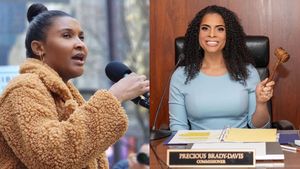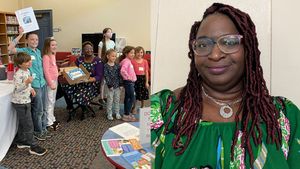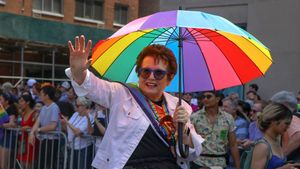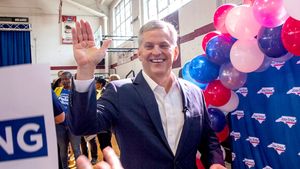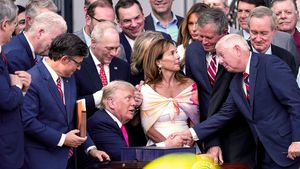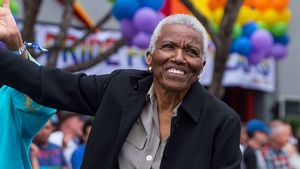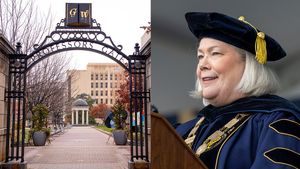Last year, in the first season of Dear White People -- the Netflix series that Justin Simien adapted from his acclaimed 2014 film of the same name -- one episode began with a quote from James Baldwin: "Not everything that is faced can be changed. But nothing can be changed until it is faced."
In this breathlessly punchy, college-set satire, where black students scramble for justice in the wake of a white student's blackface party, the words are used to prime the viewer for what's about to befall Reggie (Marque Richardson), an activist who's forever changed when a racist cop puts a gun in his face. But the quote may just as well be a mantra for Simien, a fiery sage of culture and history who has used the Dear White People franchise as a megaphone to broadcast his feelings on the shifting state of identity politics.
Related | Netflix's Dear White People Trailer Pissing Off White People
Now, as Dear White People kicks off its second season this month -- and more and more people realize why voices like Simien's shouldn't be ignored -- the 34-year-old gets candid, spilling on black Hollywood, the danger of false narratives, and how to make a post-Trump show about race.
OUT: When we see a new crisis every morning, how do you create a show that requires sociopolitical urgency, and then deliver a full season of it, binge-watch style, without it getting stale?
Justin Simen: We try to talk about root problems. We're not just talking about the inciting incident of a blackface party -- we're talking about the inability of a mass culture to see the points of view of smaller cultures within it. That's not a new conversation, but I'm talking about it from a black point of view, which America hasn't really listened to. Sure, we're funny -- the staff can write a joke -- but the underlying stuff is what matters, like the invention of race. We act as if race has been with us forever, but no one was referring to a whole group of people by a color until the slaves were freed. And even in the format of a half-hour comedy set at a college, we manage to really get into that. And that's why the show feels fresh -- because how we got to where we are in this country will never not be relevant.
Trump is never directly referenced in Dear White People, but how has he influenced the way you shape the show?
JS: Many people think we made the first season after the election, but we didn't -- we actually wrapped the day Trump was elected. We were just very real with ourselves about what was happening in America, and how no one was quite ready to say aloud how pervasive racism still was. I had hoped we were ready to deal with a black president, but we weren't. Obama was one of our country's most successful presidents, but he was still so divisive, and it was eventually so obvious that it was just racism. And when Trump won it was really devastating, but I have to say, I kind of think we needed it. Artists working through hard times used to have tolerance for certain issues because everything was status quo -- like, "Things aren't great, but at least we have a black president." Now we can't even say that. And it's empowering. There are moments in season one where we kind of asked permission to have certain conversations. With season two, there was just no reason to hold back. After Trump's election, all the doors came off, and nothing feels taboo anymore.
How did that affect the way you explore the character of Lionel, who's gay?
JS: We explore the gay community from Lionel's perspective. We go into different pockets and explore what it means to be gay at Winchester University, which means exploring what it means to be gay in America. We see what the rich -- and maybe Republican -- white gays are up to; what the bohemian, artsy white gays are up to; and what the black gays are up to. And we talk about Lionel's sex life explicitly. In this season, it was very important to us that Lionel not just be pining for someone who can't love him back, but that he actually meets a cute guy and has those awkward first experiences. I'm very excited to show gay sexuality. Typically, sex scenes in movies and TV shows are like a weird porn break for straight guys -- it's always from the straight male gaze, and it's all about the tits and the fucking. I'm curious to see how people will react to something different.
Are a lot of your writers bringing in a gaze like yours? That of a queer black male?
JS: There was this moment when we were hiring writers, and I was going through the list of people I'd been earmarking for years, and I said, "Oh, God, do we have too many gay black men on staff?" I was trying to make sure that our room was rounded out, and then I paused and said, "No one has ever asked that question about their writer's room." So yeah, there are gay black men around me, but not just gay black men, and the other gay black men have completely different perspectives than I do. Obviously, our experiences are similar, but we're different kinds of guys -- the guys we date are different; the way we approach situations are different. And our conversations spill into the show. Todrick Hall and Kid Fury co-star in season two, and it's really fun to see Lionel's black gayness bump up against their characters' black gayness, because all three are so different.

For the first time, it seems like a straight white man is the last person you want to be in Hollywood.
JS: That tells me that people are really tired of what I call the Okie Doke: the version of America that we pretend we live in but that's in no way reflective of what our lives look like. People are over it. Capital O. Just look at the movies that have come out since the presidency, and the way they've been received by the public. The opening weekend of Girls Trip and the international opening of Black Panther are undeniable. And it's not just black people who are not putting up with it -- everyone is starting to get it. Look at Wonder Woman. Patty Jenkins is the only person who's figured out how to do a DC movie and make a lot of money, and it starred a woman. People are using their dollars to let everyone know what they support. When you've been fighting and you feel like you've run out of tools on a national scale, the easiest thing you can do is buy a movie ticket.
You brought up women, who are also speaking up. How is black Hollywood receiving all this compared to the rest of the industry?
JS: There are a lot of secrets in the industry, particularly among black Hollywood. We're a small community. We don't know everything, but a lot of us know who's up to what more than anyone is really talking about. For example, with the #TimesUp movement, since the black community is also dealing with racism, we're really afraid to talk about who among us is doing this kind of stuff. Nobody wants to bring down a prominent black man, because it was really hard for that black man to become prominent. You saw it with Bill Cosby. So many of us were unwilling to believe [allegations] for so long because he's Bill Cosby. He's all we have in that arena. The stakes are higher because if you take down a powerful black man, you're taking down one of three. With a powerful white man, you're taking down one of thousands. It's one more reason why we should all be fighting for each other right now. We're being faced with questions like, "If we tolerate discrimination against women, what else are we stopping ourselves from doing?" When any group of people is oppressed in this country, it fucks us all.
As you work on Dear White People, where do you see all this going, and what gives you hope?
JS: When I made the movie Dear White People in 2014, I was speaking to an America that was unwilling to talk about these issues. What I'm having to deal with now is: What about a country that talks about too many things? And can't focus on the things that are true injustices? Russia got really good at something in its own country, and now it's exporting it: the idea where if you increase all the conversation up to a certain level, it's just like saying nothing. It's ingenious what's been done with the information overload, but the flip side is now no one's ever going to stop talking. No one goes back in a closet after they've broken through it, and nobody is going to tolerate less freedom after they've tasted more. Once you let people have a Black Panther, they're not going to accept not having it. It's our new normal. We're not going backward. So now it's about teaching people how to discern between all of these different narratives, and the new challenge is not getting caught up in false ones. I think what will eventually remain are the voices that have been authentic this whole time. And those are the liberal voices. Our voices.
You can watch the new season of Dear White People on Netflix today.




























